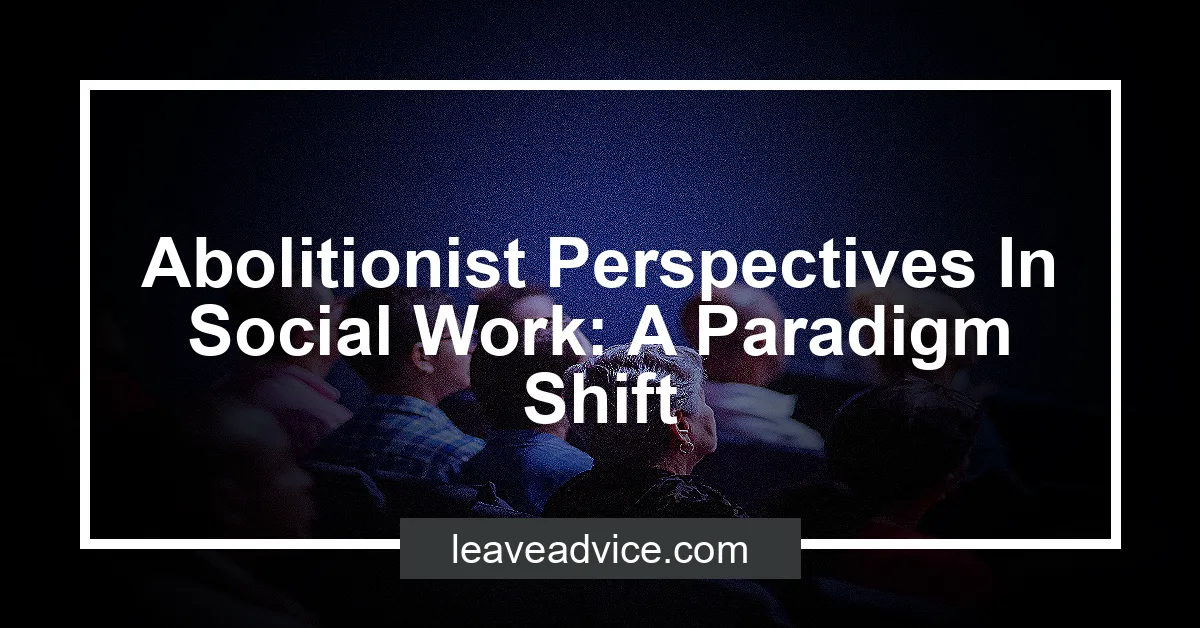Abolitionist Perspectives In Social Work: A Paradigm Shift


Abolitionist Perspectives in Social Work is a peer-reviewed, open-access scholarly journal dedicated to the development and dissemination of abolitionist principles in the field of social work. This journal serves as a platform for scholars, practitioners, and activists to explore and discuss critical issues related to social justice and liberation. In this article, we will delve into the concept of abolitionist perspectives in social work, its significance, and the ways in which social service workers can contribute to this transformative movement.
Understanding Abolitionist Social Work
Abolitionist social work is an approach within the field that aims to challenge and dismantle oppressive systems and structures that perpetuate inequality and injustice. It recognizes that social work is not simply a profession, but a commitment to social change and liberation. Abolitionist social work encompasses a wide range of practices, from direct service provision to community organizing and advocacy. It calls for the recognition and empowerment of all workers involved in social justice efforts, including social service workers, organizers, and activists.
The Importance of Education in Abolitionist Social Work
Dr. Jae, a prominent advocate for abolitionist perspectives in social work, emphasizes the role of education in fostering liberation and social justice. Education serves as a powerful tool for raising awareness, challenging dominant narratives, and equipping individuals with the knowledge and skills necessary for transformative action. However, education alone is insufficient. Dr. Jae asserts that in order to use education effectively, it is essential to critically examine existing systems and structures and actively work towards their abolition.
Advocating for Abolition in Social Service Work
Social service workers play a crucial role in advocating for abolitionist principles within their practice. They have the opportunity to challenge oppressive policies and practices, centering the experiences and voices of marginalized communities, and fostering empowerment and autonomy. By critically examining the power dynamics inherent in social work, social service workers can actively work towards dismantling oppressive systems and promoting social justice. This requires a commitment to ongoing self-reflection, learning, and collaboration with other stakeholders in the field.
The Abolitionist Social Work Toolkit
To support social service workers in their efforts towards abolition, the Abolitionist Social Work Toolkit provides valuable resources, insights, and strategies. This toolkit serves as a comprehensive guide, introducing the concept of abolition and its relevance to social service work. It explores the strategies and approaches employed by social service workers who are fighting for abolition and provides practical tools and resources for implementing abolitionist principles within practice settings.
Recommendation: Abolitionist Social Work Books
As part of our commitment to providing valuable recommendations, we have selected a few highly acclaimed books on abolitionist perspectives in social work. These books serve as essential resources for individuals interested in delving deeper into the subject matter. We recommend the following:
- “The New Jim Crow: Mass Incarceration in the Age of Colorblindness” by Michelle Alexander (Amazon Link)
- “Emergent Strategy: Shaping Change, Changing Worlds” by adrienne maree brown (Amazon Link)
- “Are Prisons Obsolete?” by Angela Y. Davis (Amazon Link)






Please note that these recommendations are based on their relevance to the topic of abolitionist perspectives in social work and the impact they have had within the field.
Conclusion
In conclusion, abolitionist perspectives in social work provide a transformative framework for challenging and dismantling oppressive systems. This article has explored the concept of abolitionist social work, emphasizing the importance of education, advocating for abolition within social service work, and introducing the Abolitionist Social Work Toolkit. Additionally, we have provided recommendations for further reading, including books that delve into the complexities of the subject. Let us continue our collective efforts towards social justice and liberation, incorporating abolitionist principles into our practice, and working towards a more equitable and just society.
Best recommended product related to the topic of abolitionist perspectives in social work: “The New Jim Crow: Mass Incarceration in the Age of Colorblindness” by Michelle Alexander. You can find this highly acclaimed book on Amazon here.


Remember, our commitment to abolitionist perspectives in social work requires ongoing education, reflection, and action. Let us work together to create lasting change and foster social justice for all.

